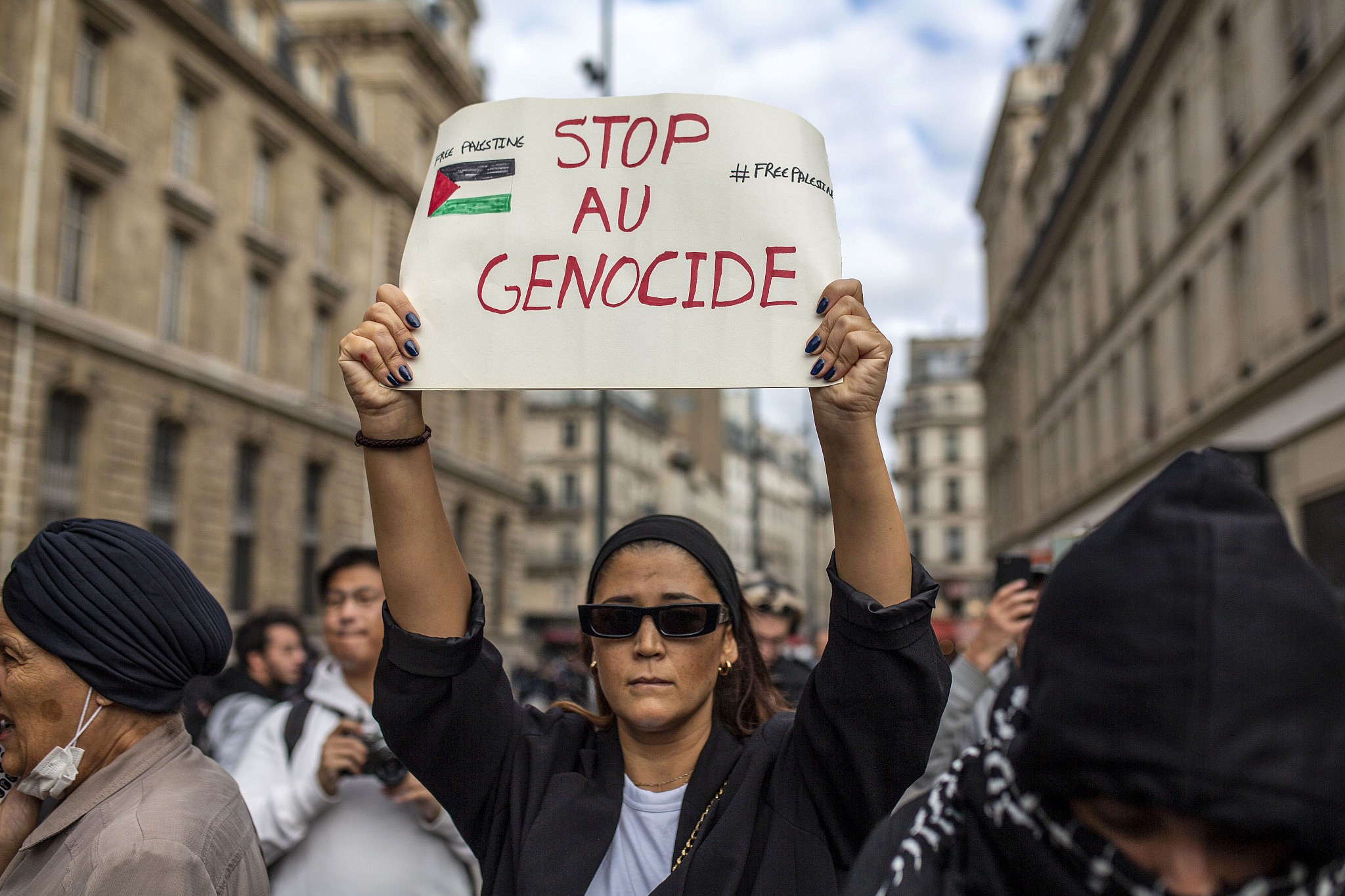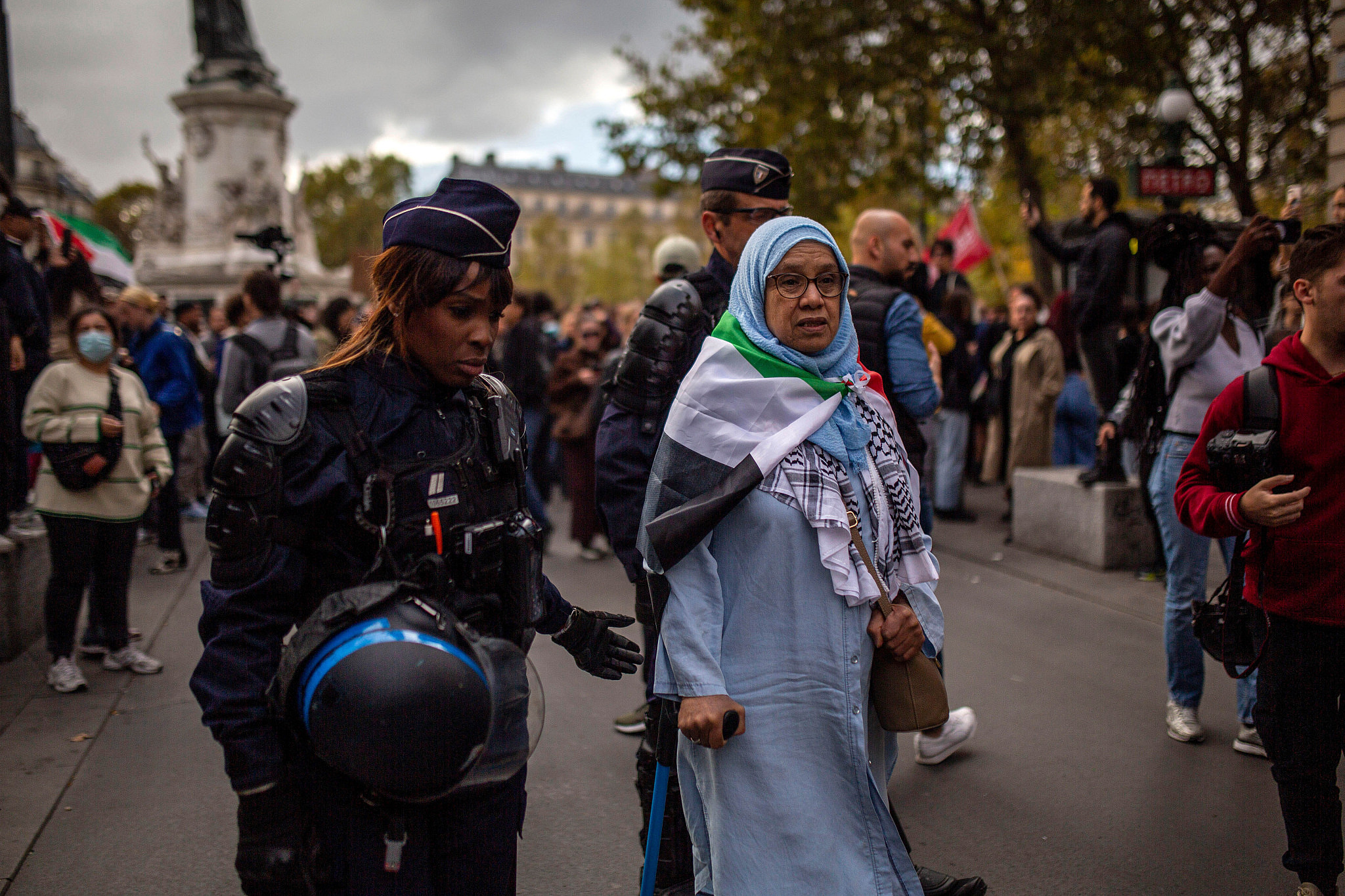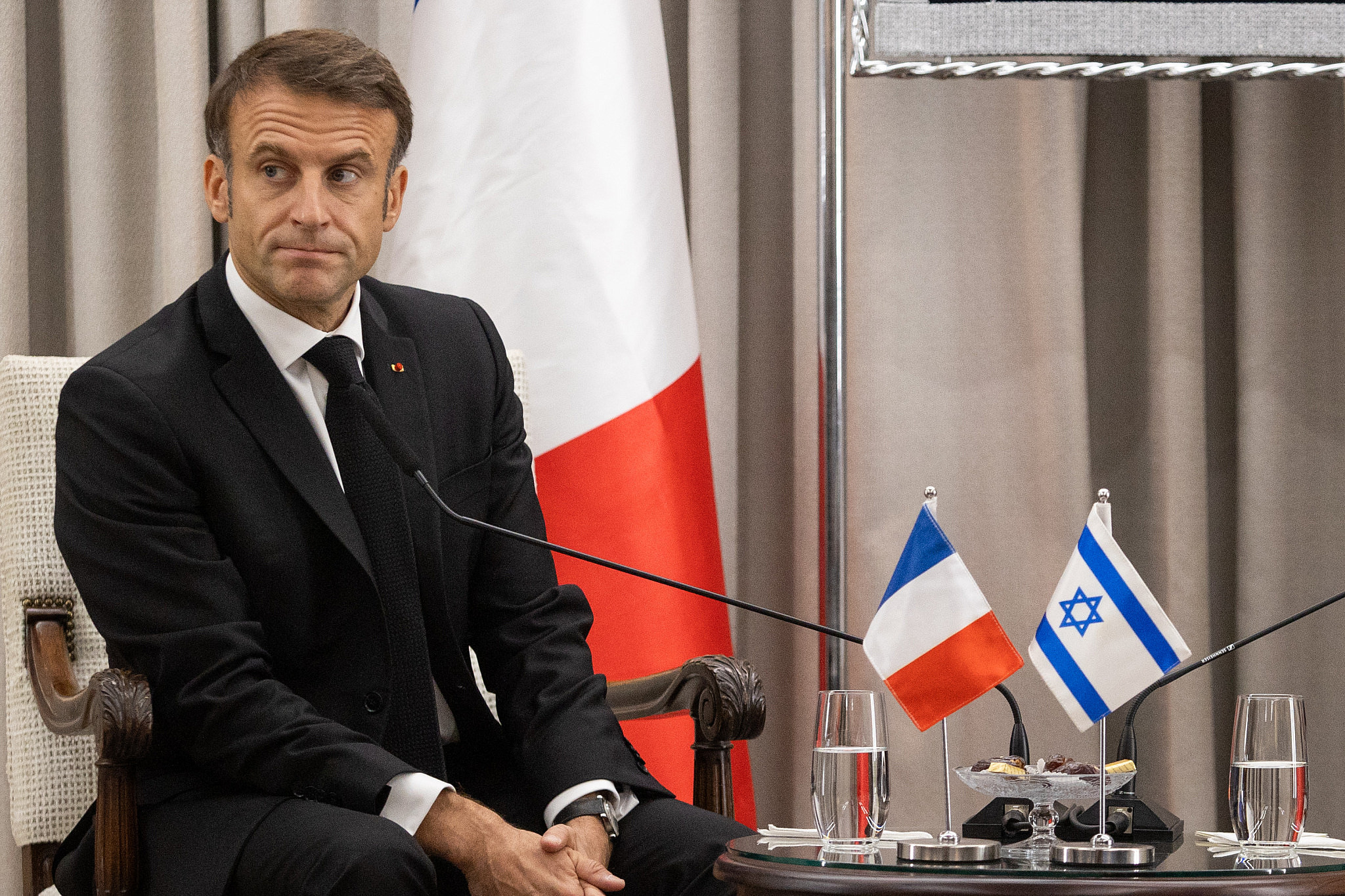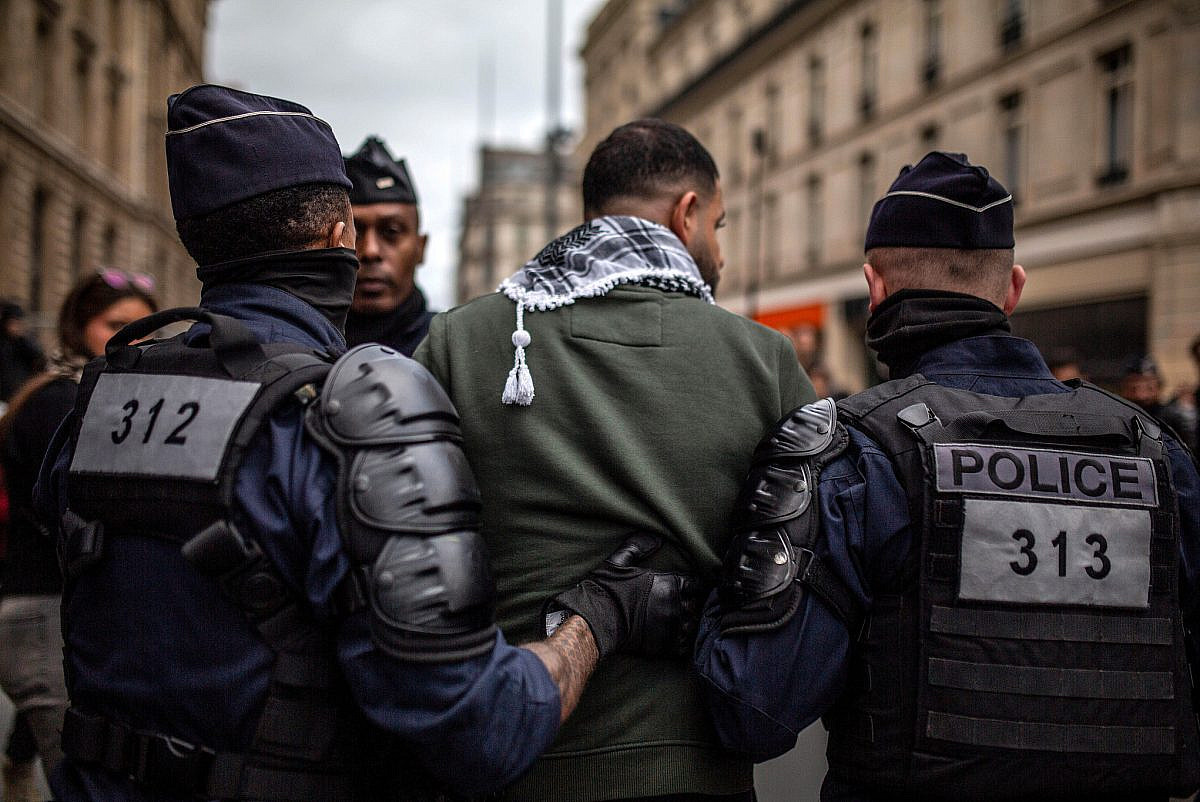The political climate in France has been tense since Hamas’ Oct. 7 assault on southern Israel and Israel’s ensuing war on Gaza. On Oct. 12, Interior Minister Gérald Darmanin ordered a sweeping ban on pro-Palestinian protests, claiming they are “likely to generate public disorder.” However, in a double standard not unusual in France, gatherings in support of Israel have been authorized, including a large march organized by the Representative Council of French Jewish Institutions (CRIF) in Paris three days after Hamas’ attack; the event drew around 20,000 participants, including political figures from across the spectrum.
While the Palestine solidarity movement was bracing itself for the systematic ban to take effect without judicial pushback, the Council of State, which acts as both a legal advisor to the French government and the highest court for administrative justice, rejected Darmanin’s order on Oct. 18. It stated that the decision on whether or not to ban protests should be given exclusively to prefects — representatives of the state in French departments, responsible for upholding the law locally — rather than imposed on a national scale.
Yet the Council of State’s statement nonetheless implied a tacit support for Darmanin’s stance. While it claimed “prefects cannot lawfully decide on a ban … on the sole grounds that the demonstration in question is aimed at supporting the Palestinian population,” it added that “in the current context, marked by high international tensions and the resurgence of antisemitic acts in France, demonstrations in support of Hamas … or which valorize or justify terrorist attacks … are likely to lead to public order disturbances.”
Though expressed in a roundabout manner, the equation between “supporting the Palestinian population” and justifying “terrorist attacks” in this statement is clear. Prefects responsible for permitting protests will undoubtedly be influenced by the broader political environment — one in which the accusation of “apology for terrorism” is loosely thrown at organizations, political parties, or politicians who either express support for Palestinian liberation or do not specifically use the term “terrorism” to describe Hamas.

This has been the case for two far-left parties: the New Anticapitalist Party (NPA) and La France Insoumise (LFI). On Oct. 10, Darmanin announced the NPA is currently under investigation for “apology for terrorism” due to a statement it issued on Oct. 7 in which it expressed its “support for Palestinians and the means they have chosen to resist,” and shared information on the blockade and humanitarian situation in Gaza. The interior Minister’s swift condemnation of the NPA’s statement and the general uncertainty as to next steps in the investigation — there has been no additional information on the case in the last three weeks — contributes to a repressive climate in which any organization that legitimizes or contextualizes Palestinian resistance could risk facing judicial investigation.
During a speech at the National Assembly, France’s lower house of parliament, LFI deputy Mathilde Panot condemned all war crimes committed by both Hamas and Israel since Oct. 7, and demanded a ceasefire, respect for international law, and an end to colonization — prompting centrist, right-wing, and far-right deputies to walk out during her speech. The far left, in particular LFI, has repeatedly been attacked in recent years, including by French Jewish institutions, for its purported inability to address perceived structural issues with antisemitism.
‘If we see you again at a protest, we will break your legs’
The prohibition of Palestinian solidarity protests is not a new phenomenon in France. In May 2021, a demonstration in Paris was banned amid Israel’s bombing of Gaza; the authorities argued the decision was made to prevent a recurrence of the violence witnessed during protests against Operation “Protective Edge” in July 2014, which were held without permits and led to clashes between protesters and the police. Concerns over antisemitic slurs and violent acts against Jewish establishments have served as the primary engine for the banning of such protests.
Most read on +972
What is different this time around is the particularly strong emphasis on “incitement to terrorism,” in addition to the usual framing of Palestinian solidarity movements as antisemitic. Darmanin, for example, described pro-Palestinian protests as “aimed at provoking or legitimizing actions of a terrorist nature.”
Protesters who have defied the ban have been met with police violence, including water cannons and tear gas, and a number have been arrested. Journalist Taha Bouhafs was arrested while covering a protest in Paris on Oct. 14. “There were very violent arrests, people were getting strangled by the police,” Bouhafs told +972. “I was filming this, and at some point the police came toward me and arrested me. I showed them my press card, but they told me I was not doing a journalist’s job, and that I didn’t have any journalist’s equipment — even though I was using my phone.
“They fined me for participating in an illegal demonstration, even though I showed them my press card,” he continued. “They told me: ‘If we see you again at a protest, we will break your legs.’”
Bouhafs witnessed the police primarily stopping Arab protesters carrying Palestinian symbols such as the flag or a keffiyeh.
At another unpermitted protest in Paris on Oct. 12, attended by roughly 3,000 people, the police arrested 10 protesters and fined a further 24. Banned protests also took place in other cities across France, including in Grenoble, Strasbourg, Marseille, Lyon, and Lille, with arrests taking place in each.
In Strasbourg, two Jewish anti-Zionist activists, who are members of the French Jewish Union for Peace (UJFP), were among those arrested after a banned demonstration took place on Oct. 13. One of them, 70-year-old Perrine Olff, was kept in police custody for 48 hours, and will be brought to court in January on the charge of organizing an illegal protest.
“Our protest was initially authorized and I met the police that week to discuss it,” Olff explained to +972. “But the night before, the protest was banned, and so I officially canceled the demonstration. Despite this, people still showed up to express their solidarity with Gaza. I was afraid of going, as I knew I would risk arrest. Even though I did not participate, police officers came to find me and arrested me as I was standing with a group of people not far from the protest.”

For Olff, the fact that such bans could be issued against demonstrations, and that she was arrested despite not participating and even officially canceling the event, was an alarming development. “I am very concerned about civil liberties in France. It is mind-blowing that prefects can prohibit protests overnight like this,” she said.
During demonstrations in the first week following the Oct. 7 attack, there were scattered reports of protesters paying a 135 euro fine for carrying a Palestinian flag at a demonstration. This phenomenon expanded significantly during the latest protest in Paris on Oct. 28. Banned only two hours before its scheduled start time, 3,000–4,000 people showed up and 1,359 people were required to pay this 135 euro fine for “participation in an illegal demonstration.” On a day when hundreds of thousands of people around the world took to the streets to demand a ceasefire and express solidarity with Gaza after a night of blackout, bombardment, and expansion of Israeli ground operations, French protesters found themselves tear gassed, fined, and beaten up by the police for attempting to do the same.
For Rima Hassan, a Franco-Palestinian activist and founder of the Observatory of Refugee Camps, the ban is a direct result of the failure of both French media coverage and political discourse on Israel-Palestine over the last few decades. “In France, the Palestinian question has long been forgotten,” Hassan told +972. “Right now, the topic has taken center stage, but it is being discussed in an emotional manner. Our identities have been essentialized. This essentialization has meant that Palestinian voices are associated with Hamas and seen as a threat to public order, which has served to justify their prohibition.”
Hassan also alluded to the inability to both grieve for all those killed while remaining committed to a historical analysis of the current situation anchored in international law. “Like Jewish people, I am also experiencing everything that is happening in a traumatic way. As a Palestinian, I have been lacking a space where I could express my empathy for Israelis, but also continue to engage in activism work for my people,” Hassan said.
Unconditional support for Israel
The French state’s current crackdown on Palestinian solidarity is not limited to the protest ban. Darmanin has also announced the dissolution of several pro-Palestinian and decolonial anti-racist organizations (thus far contained to the Collectif Palestine vaincra, the Comité action Palestine, and the Parti des indigènes de la République) for “making antisemitic remarks, condoning terrorism and supporting the Hamas terrorist movement.”

The Collectif Palestine vaincra was already targeted by a dissolution procedure in February 2022, alongside the Comité action Palestine. Darmanin accused both groups of “incitement to hatred, discrimination and violence.” Yet, in a victory for the Palestinian solidarity movement in France, the Council of State suspended this dissolution in April 2022, describing the measure as undermining “freedom of association and freedom of expression in a serious and illegal way.”
Tom Martin, spokesperson for the Collectif Palestine vaincra, explained to +972 that, though suspended, the 2022 dissolution procedure was never canceled, and the group remains at risk. He denounced “the radicalization of the French authorities’ repression against solidarity with Palestine.”
“What is new this time around is [the use of] Article 40 [of the French code of criminal procedure] on apology for terrorism,” Martin said. “This is particularly scandalous because it equates our solidarity with the Palestinian people with a form of support for ‘terrorism,’ which we refute.”
Martin argued that this is the natural result of the French government’s unconditional support for Israel. This support has been expressed repeatedly in recent days, particularly by Yaël Braun-Pivet, president of the National Assembly and member of the presidential majority. On a brief trip to Israel on Oct. 22, she stated: “France fully supports Israel, the only democracy in the Middle East, which has been attacked in a terrible way.” She added: “Of course they [the civilian population in Gaza] must be preserved, but nothing must prevent Israel from defending itself … There is an attacker and those being attacked.”
During a tense debate at the National Assembly on Oct. 23, meanwhile, Prime Minister Elisabeth Borne reminded her audience of the French government’s dedication to combating “terrorism”: “Minimizing, justifying or even absolving terrorism means accepting that it will strike again tomorrow, in Israel, France or anywhere else. We must show no ambiguity in the face of such crimes.”
This comment highlights the construction of a perceived common enemy shared by both France and Israel: terrorism. This framing, which has served as a primary motor for the censoring of Palestine solidarity organizations and protests, helps tie France to Israel in a fight against terrorism that is seen as threatening both Jewish safety in Israel and the ideal of a Judeo-Christian French nation — one in which Arabs and Muslims are increasingly marginalized.




